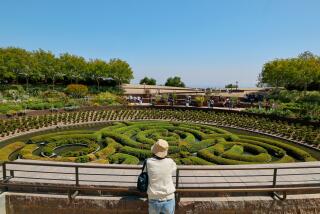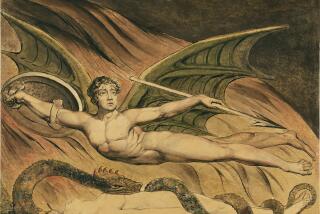Seeing ‘Eternity in an Hour’ : An unexpected side of the post-Enlightenment poet who wanted to turn the world upside down to get it right.
- Share via
Some may settle for heaven when they die; I hope to go to the Huntington Library and Art Gallery in San Marino. It is a paradise of peace, refinement and scholarship. With its splendid gardens, collections of canonical authors and rooms filled with 18th-Century paintings, it seems to many visitors an embodiment of Establishment values.
But something odd is happening at the Huntington. No, “Blue Boy” and “Pinkie” have not suddenly vanished. Rather, the walls are now also adorned with the wild works of William Blake. While Thomas Gainsborough and Sir Thomas Lawrence painted fashionable portraits of the aristocracy, Blake was almost unknown. His art and ideas strongly opposed the ruling conventions of his day.
Blake was a poet-prophet-painter in the age of the French Revolution. Like other British radicals, he gave it his passionate support. In his poems “America,” “Europe” and “The Song of Los,” he projected political revolution into a more general apocalypse that would change human consciousness as well as governments. He wished to turn the world upside down to get it right side up. Blake’s subversive allegiances were most clearly voiced in “The Marriage of Heaven and Hell.” There, he sides with the devil and denounces all “sacred codes.” The Proverbs of Hell in “The Marriage” reveal Blake’s extreme iconoclasm:
The road of excess leads to the palace of wisdom.
Prudence is a rich, ugly old maid courted by Incapacity.
Prisons are built with stones of Law, Brothels with bricks of Religion.
The tygers of wrath are wiser than the horses of instruction.
In other words, repression is bad, energy is good.
Like his writings and paintings, Blake’s life was marked by the bizarre and the dangerous. According to an early biographer, a friend came upon the poet and his wife (un)dressed as Adam and Eve while reading passages from Milton’s “Paradise Lost.” In 1803, Blake tossed a drunken soldier out of his garden. The rowdy accused Blake of assaulting him and shouting, “Damn the King”--which, given his political views, Blake may very well have done. In that age, such words were seditious, punishable by hanging. With the help of friends and a sharp lawyer, Blake beat the rap, but it was a close call.
Blake claimed that even as a child he had visions, such as beholding a tree filled with angels. Later in life, he believed some of his poems were dictated to him by spiritual presences. These visions and voices (combined with a dash of paranoia after the sedition trial) offer some evidence for those who suspected that Blake was crazy. But he was never institutionalized, and many who knew him declared him a mild-mannered fellow. If indeed Blake suffered from mental illness, he seems to have had a remarkable ability to channel his unusual ways of seeing and thinking into the production of great poetry and art. Once, while ascending the stairs in his house, he saw God creating the universe with golden compasses. He transformed this experience into his famous design, “The Ancient of Days.”
Among the artist’s most impressive works are his illuminated books. These he wrote, illustrated, etched and, with the help of his wife Catherine, printed and hand-colored. In our world of specialists and social fragmentation, Blake has come to represent a romantic union in which the creator controls the means of production. As one admirer put it, never was a man so completely the author of his books.
A generous selection of pages from these volumes can be viewed in the Huntington Art Gallery. (The Blake exhibit runs through Jan. 15.) Images of burning tigers, chained angels, a blacksmith forging suns and Satan in his fury give a glimpse of what Blake strove to see--”Eternity in an hour.” In the midst of the Huntington’s tranquility and order, he is a radical artisan and agitated soul. If you think the Huntington too elitist, take another look. Blake composed his works for those he called “Children of the future Age.”
More to Read
Sign up for our Book Club newsletter
Get the latest news, events and more from the Los Angeles Times Book Club, and help us get L.A. reading and talking.
You may occasionally receive promotional content from the Los Angeles Times.










